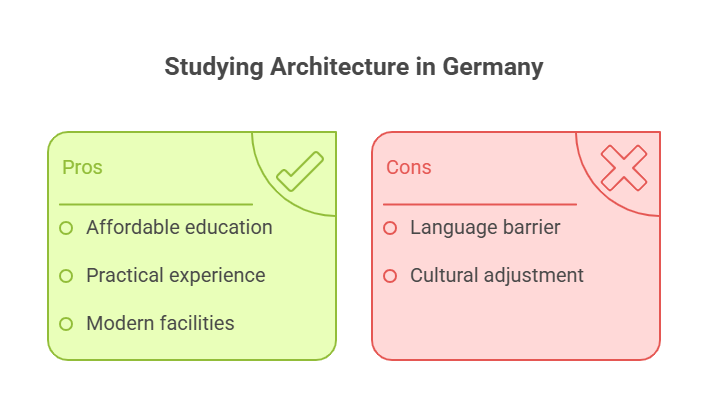Table of Contents
Thinking about pursuing a Master’s in Architecture in Germany? You’re creating a high-quality desire! Germany is domestic to a number of the sector’s quality structure schools, providing modern applications that blend layout, technology, and sustainability. With a sturdy focus on sensible practical learning and research, studying architecture right here not handiest complements your innovative talents however additionally opens doorways to exciting worldwide career opportunities. In this guide, we’ll discover the top universities, notable courses, admission requirements, and job possibilities for architecture graduates in Germany.
Why Study Architecture in Germany?
Germany has built a global international recognition for excellence in architecture and structure. The country is thought for its mixture of creativity, precision, and innovation. German universities provide top-quality training with an excellent stability among idea and exercise. Students examine from experienced professors and industry specialists who deliver real-world insights into the classroom.
Advantages of studying in Germany
1. Affordable and High-Quality Education
One of the biggest reasons global international students select Germany is its low cost t education system. Most public universities rate either no tution fees or very low costs, even for worldwide students. This ensures studying in Germany a cost-effective option compared to other major countries such as the USA or the UK. The cost of living in Germany is also reasonable and allowing students to experience a comfortable lifestyle without spending too much in studies.
2. Practical Learning and Real-World Experience
Architecture packages in Germany focus closely on practical promotion. Students often work on initiatives, take part in internships and collaborate with architectural corporations. This hands-on experience helps the development of important layout, planning and technical expertise. Upon graduation, you may have a sturdy portfolio and the self confidence to work in the global architectural field.
3. Modern Infrastructure and Innovative Learning Environment
German universities provide state-of-the-art facilities, including current studios, design labs, and sustainable building technology.The learning environment promotes creativity and innovation, making geared up college students to tackle modern-day architectural challenges along with eco-friendly designs and smart cities.
Start learning German today to fast-track your career in Germany!
Top Universities for Masters in Architecture
1: How do you say "Good Morning" in German?
Germany is home to a number of the best architecture faculties in Europe. These universities are recognized for their sturdy educational programs, revolutionary teaching methods, and close ties with the structure and construction industries. Here are a number of the top universities for pursuing a Master’s in Architecture in Germany:
1. Technical University of Munich (TU Munich)
TU Munich is one in all Germany’s most prestigious universities, regarded for its awareness on research, innovation, and era. The Master’s in Architecture software right here emphasizes sustainable design, urban plans, and current constructing technology.
Admission Requirements:
- A Bachelor’s diploma in Architecture or a related subject
- Strong academic file (minimum GPA may varies)
- A well-prepared portfolio showcasing the design and projects
- Must have proof of English fluency or German language proficiency (IELTS /TOEFL for English, TestDaF/ DSH for German)
2. RWTH Aachen University
The RWTH Aachen university is famous for its engineering and architecture programs. The university gives a incredibly practical and resaerch-based, which totally Master’s program that integrates layout with creation, making plans, and management.
Admission Requirements:
- Bachelor’s degree in Architecture or a related discipline
- Competitive GPA
- A portfolio demonstrating creativity and technical potential
- Language proficiency: Most guides are in German, so TestDaF or DSH is needed; a few English-taught programs may additionally require IELTS/ TOEFL
3. Technical University of Berlin (TU Berlin)
TU Berlin offers a globally identified architecture software that makes a speciality of urban design, virtual creation, and sustainability. The universities has sturdy ties with main architecture corporations, giving students possibilities for internships and networking.
Admission Requirements:
- Bachelor’s degree in Architecture
- Minimum GPA as per university standards
- A detailed portfolio of design work
- Proof of language proficiency (most Master’s programs are offered in German; English-taught options may need IELTS/TOEFL)
4. University of Stuttgart
The University of Stuttgart is thought for combining architecture with engineering and modern technology. Its Master’s in Architecture application programs emphasizes design, building overall performance, and sustainability. Students benefit from getting admission to modern labs and workshops.
Admission Requirements:
- A renowed Bachelor’s diploma in Architecture
- A strong educational heritage and a strong portfolio
- Proof of German or English language talent depending at the path (DSH/ TestDaF or IELTS/ TOEFL)
Why Choose These Universities?
All those universities provide international-elegance training with a focal point on each layout and technical expertise. They also offer worldwide exposure, modern-day infrastructure, and possibilities for hands-on experience through initiatives and internships. Graduating from any such establishments can open doors to a successful worldwide career in architecture.
|
German A2 Exercises – Download Free PDF |
||
Free German A1 Mock Tests – Powered by AI!
Test your skills on our interactive platform. Get instant feedback from our AI to help you communicate better and track your progress. Start your free German mock test now.
Test Your German A1 for FreeCourse Structure and Specializations
A Master’s in Architecture in Germany is designed to combine creativity with generation and research. The applications attention on developing both layout and analytical talents, making ready students for a extensive variety of roles in the architectural area. Most Master’s packages final two years (four semesters) and are divided into core topics, electives, research initiatives, and practical training.
Core Subjects
The core subjects assist college students build a sturdy basis in both traditional and modern factors of architecture. Some common topics include:
- Architectural Design and Theory – Which enhances the creativity and conceptual thinking.
- Construction Technology – Focuses on materials, structures, and sustainable building strategies.
- Urban Planning and Design – Deals with the town development and making plans.
- Building Performance and Sustainability – It covers the power efficiency and eco-friendly designs.
- Digital Design Tools – Introduces software like AutoCAD, Revit, and BIM for the present day architecture.
Research Opportunities
German universities emphasize research-based gaining knowledge. Students are encouraged to explore revolutionary design methods, smart city standards, and sustainable production strategies. Many applications encompass research initiatives in collaboration with architectural companies, research institutes, or city planning departments. This publicity allows college students practice instructional knowledge to actual-international issues.
Practical Projects and Internships
Hands-on experience is a key part of studying architecture in Germany. Students take part in studio tasks, workshops, and internships that simulate real architectural challenges. These sensible periods no longer most effective design abilties but also enhance teamwork, conversation, and project control abilties.
|
Goethe 2025 Exam Dates: Multiple Test Centers |
|
| Trivandrum Goethe Exam Dates | Kochi Goethe Exam Dates |
| Chennai Goethe Exam Dates | Coimbatore Goethe Exam Dates |
Popular Specializations
During the Master’s programs, every students can select numerous specializations based on their interests and career desires.
- The Urban Design: Which focuses on making plans and growing sustainable towns and public areas.
- The Sustainable Architecture: It highlights eco-friendly materials, energy-efficient consrtuctions, and the green layout.
- The Digital Architecture: It combines modern technology, 3D modeling, and the parametric layout to create the revolutionary systems.
- The Interior Architecture: Which specializes on designing the functional and aesthetic indoor areas.
- The Landscape Architecture: Which deals with outdoor spaces, environmental design, and the concrete greenery.
Eligibility and Admission Requirements
Before making use of for a Master’s in Architecture in Germany, it’s crucial to understand the fundamental eligibility criteria and admission technique. German universities keep excessive academic standards, so applicants should display sturdy academic backgrounds, innovative ability, and language capabilities. Here’s a detailed study what maximum universities require:
1. Bachelor’s Degree Requirements
To apply for a Master’s in Architecture, you need to preserve a Bachelor’s diploma in Architecture or a intently related area which includes Civil Engineering, Urban Design, or Interior Architecture.
- Most universities expect your undergraduate program to have covered key subjects like design, construction, and structural systems.
- You should have a good academic record — usually, a minimal GPA equal to 2.5 or above on the German scale (requirements may additionally vary by university).
- Some universities may additionally ask for relevant work experience or internships in the architecture subject, even though this is not usually obligatory.
2. Language Requirements
Since packages in Germany are offered in each English and German, you’ll need to provide proof of language talent primarily based on the language of instruction.
For English-taught programs:
- Most universities accept IELTS (generally a minimal score of 6.5) or TOEFL (around 80–90 iBT).
- Some universities may be given different certifications which include PTE or Cambridge English assessments.
For German-taught programs:
- You’ll want to illustrate your skillability via diagnosed exams like TestDaF, DSH, or Goethe-Zertifikat.
- It’s normally encouraged to have as a minimum a B2 or C1 level in German according to the Common European Framework of Reference (CEFR).
3. Portfolio Submission
A portfolio is one of the most essential elements of your application. It allows the admissions committee to assess your creativity, design technique, and technical competencies.
- Your portfolio have to include your pleasant architectural projects, drawings, sketches, 3D models, and academic or private layout paintings.
- Make certain it’s well-organized and visually attractive — quality matters more than quantity.
- Some universities also ask for a motivation letter explaining your interest in architecture, your goals, and why you selected that unique university.
4. Interviews or Additional Assessments
A few universities may conduct online or in-person interviews to assess your passion for architecture and information of design standards. Others would possibly require a layout test or aptitude assessment before final selection.
Costs and Scholarships
Studying a Master’s in Architecture in Germany isn’t always a great academic opportunity however additionally an inexpensive choice in comparison to many different international locations. Germany is known for presenting extraordinary education at low tution fees, specially in the international universities. However, the students nevertheless need to plan for their living costs and other study-related expenses.
1. Tuition Fees
Most public universities in Germany offer free education facilities or rate only a small administrative charge.
- In many cases, students only pay a semester fee, which normally between in the range of €150 to €350.
- This fee may often covers all students services, public transportation, and campus facilities.
- However, some universities in states like Baden-Württemberg may charge non-EU college students training expenses of around €1,500 per semester.
- The private universities, can rate better tuition fees — normally ranges between €5,000 and €10,000 according to year, depending on the program and institution.
2. Cost of Living in Different Cities
The cost of living in Germany relies upon on where you study and according to your location. In major cities cost of living tend be more expensive, even as smaller cities are more budget-friendly. Students mostly need to pay around €850 to €1,200 per month to cover their accommodation, food, transportation, medical insurance, and other expenses.
Here’s a quick overview of average monthly living expenses in each city:
- Munich: The cost of living ranges between €1,200 – €1,500 (which is one of the most expensive cities)
- Berlin: The cost of living ranges between €1,000 – €1,300
- Stuttgart: The cost of living ranges between €1,000 – €1,200
- Aachen: The cost of living ranges between €900 – €1,100
- Dresden or Leipzig: The cost of living ranges between €800 – €1,000 (which is more affordable options)
3. Scholarships and Funding Options for International Students
Germany offers several scholarships and financial aid packages for international college students who need to pursue a Master’s in Architecture. These scholarships can helps to cover their tution fees, living costs, etc.
Some famous funding options include:
- The DAAD Scholarships (German Academic Exchange Service): One of the well-known packages that offers complete or partial funding for the education for international students totally based on merit.
- The Deutschlandstipendium: Which provides financial support of around €300 per month , funded together with the help of the government and private sponsors.
- The Erasmus Program: Available for the college students taking part in change programs within the EU.
- University-unique Scholarships: Many universities like TU Berlin, RWTH Aachen, and TU Munich have their own merit-based scholarships for the students.
- Private and Foundation Grants: Organizations which include Heinrich Böll Foundation or Konrad Adenauer Foundation also provide some scholarships to the international students.
Free German A1 Mock Tests – Powered by AI!
Test your skills on our interactive platform. Get instant feedback from our AI to help you communicate better and track your progress. Start your free German mock test now.
Test Your German A1 for FreeCareer Opportunities After Graduation
A Master’s in Architecture from Germany opens up a global of interesting profession opportunities — both within the country and the world over. German degrees are tremendously reputable worldwide, and the country’s strong financial system, awareness on innovation, and growing demand for sustainable layout make it a notable region to begin your architectural profession
1. Job Prospects in Germany and Abroad
Germany’s architecture and production sectors are constantly evolving, growing numerous job opportunities for graduates. As the country makes a speciality of sustainable infrastructure and smart city improvement, professional architects are in excessive demand.
- Architect or Design Consultant
- Urban or Regional Planner
- Interior Architect
- Landscape Architect
- Project Manager or Construction Planner
- Sustainable Design Specialist
Graduates from German universities are also well-prepared to work the world over. The combination of technical competencies, design innovation, and realistic experience accured during studies makes you competitive in global architecture markets which includes Europe, the Middle East, and Asia.
2. Employment Sectors
Architecture graduates can find opportunities in numerous fields relying on their understanding and interests:
- Architectural firms and the layout studios: Work on residential, industrial or public projects focusing on the creativity and layout excellence.
- Urban planning agencies: Contribute to sustainable city planning, infrastructure design and their network improvement.
- Construction and engineering corporations: Oversee the technical factors of construction projects, ensuring the safety and overall performance.
- Government and the Research Institutions: Participate in city coverage improvement or studies on sustainable and smart city solutions.
- Real Estate and Development Firms: Provide design session for brand new housing and industrial projects.
3. Work Visa and Post-Study Stay Options
Advantage of studying in Germany is their lifestyle and opportunity to work immediately after the graduation. Germany’s visa guidelines make the transition from student life to professional careers easier for graduates, especially in the high-demand fields like architecture.
Here’s how the visa process works:
- After completing your Master’s degree, worldwide students can practice for an 18-month publish-study work visa (Residence Permit for Job Seekers).
- During this time, you could search for a full-time job related to your discipline.
- Once you secure a job, you can observe for an EU Blue Card or a work residence allow, allowing you to work and live in Germany long-term.
- If you hold operating in Germany for some years, you may even become eligible for everlasting residency.
Tips for International Students
Studying in Germany is an thrilling experience that offers no longer most effective educational growth however additionally personal and cultural development. However, transferring to a new country can be challenging in some point. To make your transition smoother, here are some useful tips for students who pursuing Master’s in Architecture in Germany.
1. Finding Accommodation
Finding an area to live is one of the first matters to plan after receiving your admission letter. Germany offers various housing options for students:
- Student Dormitories (Studentenwohnheim): These are affordable and controlled by student offerings (Studierendenwerk). They’re superb for meeting different students and cost round €250 to €400 per month.
- Shared Apartments (WG – Wohngemeinschaft): Many students choose sharing apartment with others to save their cost of living and experience extra independence. Apartment rent may typically varies among €350 and €600 per month, depending on the location you choose.
- Private Apartments: This is ideal for individuals who wants more privacy, however which is more expensive, mainly in large cities like Munich or Berlin.
2. Student Life and Cultural Adaptation
Germany has attractive student tradition and culture. All universities in Germany frequently arrange events, workshops and student clubs where you could meet people from distinctive backgrounds. Germans punctuality, performance, and honesty, which may be useful to adopt at the same time as you residing inside the country.
- Learn a bit of primary German to make daily lifestyles less difficult and to connect better with locals.
- Embrace the local culture — attempt traditional German meals, discover historical cities, and take part in cultural fairs.
- Use your student ID for discounts on transport, museums, cinemas, and restaurants.
3. Networking and Internships
Networking plays a important function in building a a success architecture career. Building strong professional relationships during your research will assist you set up a strong basis on your profession in Germany or abroad.
- Attend structure exhibitions, university workshops, and expert meetings to satisfy architects, professors, and industry specialists.
- Join student institutions or expert networks like the German Architects’ Association (BDA) to benefit insights into the local architecture scene.
- Most architecture applications in Germany encompass internships as part of the curriculum. These provide precious hands-on experience and might often lead to full-time job offers after graduation.
Start learning German today to fast-track your career in Germany!
Conclusion
Pursuing a master’s degree in architecture in Germany is a fantastic aspiration for students who dream of a blend of creativity, innovation and worldwide exposure. With world-class universities, affordable education and a strong awareness of sensible expertise, Germany presents the ideal environment to develop as an architect. Apart from teachers, living in Germany offers rich cultural studies, networking opportunities and a clear path to a rewarding profession both locally and internationally. If you are passionate about layout, sustainability, modern structure and architecture, Germany could be the best place to build your fortune and create the world around you.
| Related Links | |
| Masters in Economics in Germany | Masters in Cyber Security in Germany |
| Best Universities in Germany for Computer Science | Best Universities in Germany for Finance |
Free German A1 Mock Tests – Powered by AI!
Test your skills on our interactive platform. Get instant feedback from our AI to help you communicate better and track your progress. Start your free German mock test now.
Test Your German A1 for FreeFrequently Asked Questions
Is Germany a good place to study architecture?
Yes, Germany is one of the best countries in the world to study architecture. It is known for its excellent universities, modern infrastructure, and strong emphasis on both design and technical skills. German degrees are internationally recognized, and students benefit from affordable education, hands-on training, and access to leading architecture firms.
What are the top universities for a Master’s in Architecture in Germany?
Some of the most prestigious universities offering architecture programs include:
-
Technical University of Munich (TU Munich)
-
RWTH Aachen University
-
Technical University of Berlin (TU Berlin)
-
University of Stuttgart
-
Bauhaus University Weimar
These universities are known for their innovative teaching, research opportunities, and strong industry connections.
What are the eligibility criteria for admission?
To apply for a Master’s in Architecture in Germany, you generally need:
-
A Bachelor’s degree in Architecture or a related field
-
A strong academic record (minimum GPA varies by university)
-
A portfolio showcasing your design work
-
Proof of language proficiency (IELTS/TOEFL for English-taught programs or TestDaF/DSH for German-taught programs)
Some universities may also conduct interviews or design tests as part of the selection process.
Do I need to know German to study in Germany?
Not necessarily. Many German universities offer English-taught Master’s programs in architecture, especially for international students. However, learning basic German is highly recommended as it helps with daily communication, internships, and part-time jobs. If your program is taught in German, you’ll need to provide proof of proficiency (usually B2 or C1 level).
How much does it cost to study architecture in Germany?
Most public universities in Germany offer free or very low tuition fees. Students usually pay only a small semester contribution (around €150–€350). However, you’ll need to budget for living costs, which average between €850 and €1,200 per month, depending on the city. Private universities may charge tuition fees ranging from €5,000 to €10,000 per year.
Are there scholarships available for international students?
Yes, international students can apply for several scholarships, including:
-
DAAD Scholarships (German Academic Exchange Service)
-
Deutschlandstipendium
-
Erasmus+ Program
-
University-specific scholarships offered by TU Munich, RWTH Aachen, and others.
These scholarships can help cover tuition, living expenses, or both, depending on your academic achievements and financial need.
What career opportunities are available after graduation?
Graduates with a Master’s in Architecture from Germany can work as architects, urban planners, interior designers, or sustainable design consultants. Germany has a strong job market for architects, and the skills you gain are globally valuable. You can work in architecture firms, construction companies, research institutions, or even start your own design practice.
Can I stay in Germany after completing my studies?
Yes. International students can apply for an 18-month post-study work visa to find a job in their field. Once you secure employment, you can switch to a work visa or EU Blue Card, allowing you to live and work in Germany long-term. After working for several years, you may even qualify for permanent residency.














